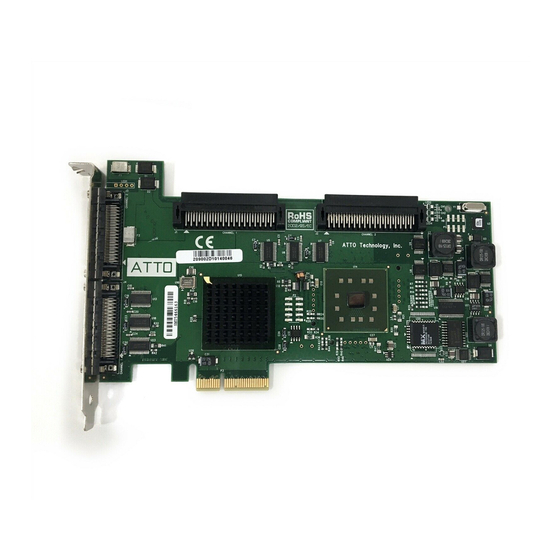Boot into Windows and use the ATTO Configuration Tool to verify the host
adapter has its termination set properly. Instructions to do this can be found in
the help portion of the ATTO Configuration Tool.
Verify the external terminator is the same SCSI type as the devices (certified for
Ultra320 SCSI or lower) and does not have damaged pins.
Try attaching SCSI devices one at a time with different cables, adding drives and
cables until the problem occurs. This will help pinpoint the device or cable
causing the problem.
Watch the LED indicators on the SCSI devices before, during, and after startup.
Drive lights should also flash at startup as the SCSI bus is scanned. This may
give a clue as to the root cause of the issue.
The system's BIOS scan recognizes the UL5D host adapter, but it does not detect
any of the connected SCSI devices.
Note: The ATTO Technology banner should appear shortly after rebooting the
computer. If the host adapter's BIOS is set to "enabled" or "scan only", the
connected devices, SCSI ID and negotiated transfer rate for each of the SCSI
busses will also be displayed.
The SCSI host adapter BIOS may have been set to disabled (factory default:
BIOS enabled). Set it back to Enabled (if you need to boot from an external
device connected to the host adapter) or Scan Only.
Verify the SCSI devices are powered on.
Check the SCSI devices to make sure that they are all set to different SCSI ID's.
Each device on each SCSI bus must use a unique ID, including the host adapter.
Devices on Bus 1 can have the same IDs as those on Bus 2. By default, the host
adapter uses SCSI ID 7, so devices should use ID's 0 through 6, or 8 through 15.
Check cable integrity. Check the cables for solid connections. Make sure they
are screwed down. Inspect cable ends for bent pins. U320 SCSI requires high
quality cables that are specifically rated for the U320 transmission speeds.
Boot into Windows and use the ATTO Configuration Tool to verify the host
adapter has its termination set properly.
the help portion of the ATTO Configuration Tool.
Verify the external terminator is the same SCSI type as the devices (certified as
usable for Ultra320 SCSI or lower) and does not have damaged pins.
Try attaching SCSI devices one at a time with different cables, adding drives and
cables until the problem occurs. This will help pinpoint the device or cable
causing the problem.
Watch the LED indicators on the SCSI devices before, during, and after startup.
Drive lights should also flash at startup as the SCSI bus is scanned. This may
give a clue as to the root cause of the issue.
Try putting the host adapter in a different PCI slot.
Try updating the firmware on the host adapter as described in the "Installation
and Operations" manual.
If all else fails, replace the SCSI host adapter.
Page 3 of 12
Instructions to do this can be found in
Atto Technology, Inc.
January 19, 2007

